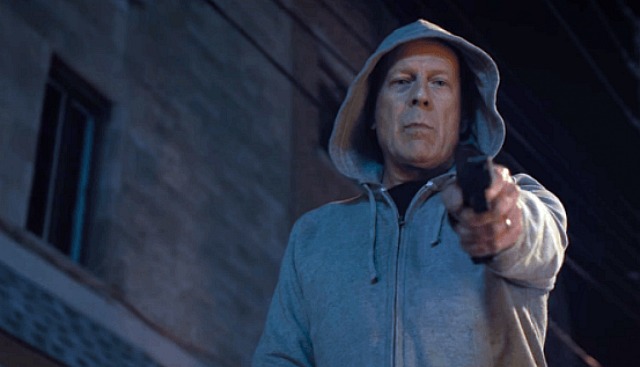The night before last I caught Eli Roth and Joe Carnahan‘s Death Wish. I didn’t completely despise it. I chortled two or three times. The performances by Bruce Willis and Vincent D’Onofrio are reasonably decent. But it’s not my idea of really well-written (they should have stayed with Joe Carnahan’s original 2015 script), and is therefore not very believable. I was sitting there going “fake, oversold, uhn-uh, nope, bullshit, not right, cliche, sloppy,” etc.
But at the same time it was occasionally competent enough to make me wonder if Death Wish might improve its game, at least during the first act. It never did. It’s mainly a fantasy wallow for righties and NRA enthusiasts and lost-in-their-own-realm LexG-types, and one that constantly nudge-nudges those who are already in the pro-gun camp.
It’s certainly not as precise or zeitgeisty as Michael Winner and Charles Bronson‘s 1974 Death Wish (exploitation films work better if they dial it down and take their time in delivering the payoff moments). It’s nowhere near as good as the first John Wick (’14), and not as occasionally satisfying as Antoine Fuqua‘s The Equalizer (ditto), which was otherwise a second-rater.

There’s a place in my head for top-tier rightwing action flicks about showing no mercy to scurvy bad guys. I still say the all-time best in this realm is Tony Scott‘s Man on Fire (’04), and for reasons far too numerous to list here.
The most important thing to remember if you’re going to make one of these things is to (a) avoid happy-family cliches and (b) stay away from trying to message the audience with thin slices of conservative theology. Death Wish flubs it on both counts.
Its first-act depiction of the family life of Chicago-based surgeon Paul Kersey (Willis, married to Elizabeth Shue‘s Lucy Rose and about to send Camila Morrone‘s Jordan off to college) is way too alpha and serene. This will come as a shock to Roth and Carnahan, but real-life families occasionally irritate or bore each other, and sometimes they even argue. And then comes an “oh, please!” when Willis asks a friend of Jordan’s what book she’s reading, and she says it’s a school assignment, and that the author is Milton Friedman, the conservative economist who advised Ronald Reagan and Margaret Thatcher. (I don’t remember if she mentioned a title, but it was probably “Capitalism and Freedom.”) I wonder if this scene is from Carnahan’s original screenplay or what.
I understand why Roth’s film is set in Chicago, which is regarded as the most gun-violent city in the U.S. right now (despite the fact that on a per-capita basis Chicago’s murder rate was lower last year than that of seven other cities). But Roth is trying to sell the idea that wealthy suburbanites (like Willis’s Kersey) are living under siege conditions, and that feels to me like an NRA fantasy. (My limited understanding is that the vast majority of Chicago’s gun deaths have occured in the city’s unruly south side.)
And watching a feature-length NRA commercial feels especially unsettling in the wake of the Parkland massacre, which happened, yes, due to local cops and the FBI failing to act on warnings about high-school age shooter Nikolas Cruz, but also due to extremely lax regulations about under-21 wackos being able to easily purchase AR-15s and other automatic weapons. But if Death Wish had been better — if it had been Son of Man on Fire — I would’ve bought it anyway. It’s just not smart, catchy or crafty enough.
Box-Office Mojo has reported, by the way, that it made $4,275,000 yesterday and that it will probably end up with $12 million for the weekend. Not terrible but not great.









